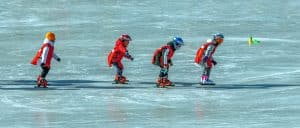All said winter training people get the world, but if you can’t stick to it…and you’ve been slacking off for a while, do you know how long will it take you to recover after you stop running?
Answers to how long will it takes you to recover after you stop running in winter
Researchers at Harvard University did a study in which they tracked 21 runners who were running an average of 51 kilometers per week in preparation for the 2016 Boston Marathon.
After the race, the participants were asked to refrain from any running activity for eight weeks, with no more than two hours of exercise a week. Four weeks after the competition, their blood volume decreased by 3.6 percent. Plasma volume decreased, and the left ventricle became smaller, indicating a decrease in the body’s ability to pump blood.
In terms of athletic performance, both VO2max (maximum oxygen uptake) and total hemoglobin decreased significantly, with VO2max decreasing by 1% per day
VO2max is the amount of oxygen that the body can take in when it is unable to support a subsequent exercise at its maximum intensity. As one of the important selection bases of endurance athletes, it is an important indicator to reflect the aerobic ability of the human body. When it drops, the outward manifestation is that running at the same pace makes you feel more tired, less endurance, and can last less distance.
In general, if you don’t train for 4 weeks, you lose 4 to 25 percent of your energy, including capillaries, heart volume, mitochondria, muscular endurance, as well as muscular nerve coordination.
Previous studies have also found that when you stop exercising for a month, your body’s ability to break down lactic acid decreases, meaning your lactate threshold drops.
At this time, when you work out at your usual intensity, your body can’t get rid of lactic acid as fast as it’s being produced, and it starts to build up in your blood, the speed is so quick that your body can’t keep up.
Basically, when you stop running, you need to train twice as long to compensate. It is believed that if you stop training for a week, it takes two weeks to make up for the loss of form.
How to recover quickly after stopping running for a while?
So how to recover quickly is an issue that most people are concerned about. It’s not that hard to get back into training, it’s definitely easier than when you first started running. Here are a few tips to make your recovery process a little easier:
- Get well equipment. Like mens fitness apparel, and women’s sports bra.
- Recover from a 1kilometres–running and slowly build up. When you resume running, think of yourself as a beginner, running from scratch.
- Start as slowly as possible. Because after a long, month-long break, your heart, lungs, and leg muscles will lose their strength.
- Set a goal. You need to figure out why you’re running again, and once you set a goal, you’ll be more motivated to train.
- Follow the plan step by step. Slowly restore your strength and muscles, joints, and ligaments to the movement again. If you have any pain during your recovery run, stop, and rest.
- Count the time of suspension. Recovery time is different due to different time intervals. Typically, it takes at least two days of training to make up for each day lost.
- Recognize that strength recovery is the slowest. The rate of loss of strength was slowest after the training was stopped. So, it’s also the slowest to recover. Knowing this point, one should be patient with the restoration of strength. As an old saying goes: Don’t rush anything.
- Do not enter the competition too early. People who love running may also like to attend competitions. Playing in a game is a good way to test your fitness, but pushing too hard can lead to injury. If you really want to enter a competition. You should reenter the competition with a relaxed mind, regardless of the result.
While it takes a lot of courage to get out and run in the middle of the winter, there are many benefits to keeping running in the winter. When you do it for a month, a winter, you realize that a few degrees below zero are nothing. psychologically, you love it and you get used to it. Physically, running in the winter makes the capillaries more developed, which makes the blood flow in your body more fluid.
Tip on post-Run Recovery:
Here are some things you shouldn’t do after a run:
1. Do not sit on the floor immediately.
2. Do not take a bath immediately.
3. Do not quench your thirst with cold drinks.
4, Do not eat much.
5. Do not drink or smoke to relieve fatigue.
Here are some things to do after a run:
1. Change clothes in time.
2. Stretch Thoroughly.
3, Eat appropriate water and food.
4, Get enough sleep









